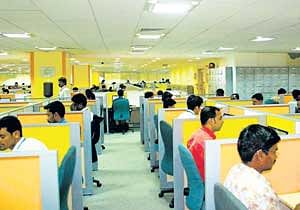

The Indian IT sector has survived the past economic crisis rather unscathed; however there are several challenges that the sector has to overcome towards its ride back to glory. Apart from the delayed repercussions of the economic crisis there are many other problems which haunt the sector today. An industry which largely depends on the economic health and spending power of the western countries is much worried about the somberness in this region. The United States of America and affluent countries in Europe are cautious about spending and their economic recovery is also giving conflicting signals after the unprecedented financial turmoil of the decade till a year ago.
The IT sector - software and business process outsourcing (BPO), being one of the fastest growing industries in the country plays a very important role in the economy. India’s software export revenue at $45 billion in 2009-10 contributed to more than 8 per cent of India’s Gross Domestic Product (GDP) and also provided jobs to more than 5 million people, directly and indirectly. No wonder analysts tracking the industry were eagerly waiting for the month of July to learn about the financial performance of leading IT companies like Infosys, TCS, Wipro Technologies, HCL and midsize companies like MindTree, Sonata Software, Patni, iGATE among others, which declared their results for the June quarter, the first one of the financial year after the recession.
A mixed bag
The first IT company to announce the result for Q1 was Infosys Technologies, India’s second largest software exporter. Surprisingly, Infosys reported a 2.4 per cent decline in Q1 profit at Rs1,488 crore. Infosys revenue for the quarter rose to Rs 6,198 crore as against Rs 5,472 crore, registering a Y-o-Y growth of 13.3 per cent. The financial result created a feeling of insecurity for the sector and many questions were raised in this regard.
Infosys CEO S Gopalakrishnan announcing the results said its profit was hit due to increased employee cost and fluctuating foreign currency including the Euro and US dollars. Indicating optimism and recovery in the India business Gopalakrishnan also said, “While the global economic environment remains uncertain, we continue to see greater demand for services from our clients.” However, the results of Infosys didn’t meet the expectation and calculation of the market researches.
Unlike Infosys the results of other IT biggies were positive. Tata Consultancy Services (TCS), the country’s largest IT firm by revenue, reported a 15 per cent growth in income to Rs 8,312.74 crore. Similarly, Wipro Technologies IT services business revenue also grew 14 per cent at Rs 5,500 crore. They also did better in terms of profits. In the June 2010 quarter, TCS, for example, reported a net profit surge of 24 per cent to Rs1,906 crore and Wipro Rs 1,319 crore, registering a Y-o-Y growth of 31 per cent.
The mid-sized IT firms too had mixed fortunes in terms of revenue and profits in the June quarter. While iGATE witnessed a jump of 84 per cent in net profit, Sonata Software could raise net profit only by 11 per cent. But MindTree reported a sharp 72 per cent drop in profit. Though the margins were impacted in the April-June period for almost all companies most of the players managed to maintain profits and revenue growth.
Very high churn
The sector which is yet to recover fully from the impact of recession faced by its clients, is facing another crisis. The June quarter showed that managing human resources was a big challenge. With many offers in their pockets, large number of software engineers changed jobs for higher pay. As a result almost all large companies experienced very high attrition rates of employees. Experts feel that market recovery and attrition are two sides of the same coin. When there is a recovery in the business environment employees seek better pastures for growth.
The attrition rate in Q1 for IT Services business for TCS was 12.3 per cent and in BPO business was 20 per cent. Similarly, the attrition rate in Wipro and in Infosys jumped to around 16 per cent during the April-June period quarter, which is very high compared to the average rate of around 7-8 per cent in these two companies. “After a near freeze for more than four quarters, companies are hiring again and the job market is slowly opening up. Another reason is that clients have allocated budget for IT spending and contracts have been signed leading to increased demand for talents,” said Zinnov Management Consulting Director Karthik Ananth. So severe was the problem in Infosys that it had to initiate some new HR programmes to plug employee outflow.
Others like Wipro, MindTree, HCL Technologies and iGATE offered large salary hikes and promotions to stop people deserting them. “We have done some restructuring for employees with 3-7 years of experience, over 20,000 people have been promoted since July 1,” said Wipro Technologies CFO Suresh Senapathy.
Fluctuating currency
Another major worry faced by IT firms is the cross currency fluctuation. During the quarter Indian rupee remained volatile against the US dollar and Euro which was a major worry for the business. The currency volatility and Euro crisis dented Wipro’s revenue generation from European regions significantly. During the quarterly result announcement TCS, said the firm made a foreign exchange loss of Rs 47.18 crore in the quarter. Infosys Chief Financial Officer V Balakrishnan also said “Our profitability was hurt by currency volatility, and lower billing rates.”
European vexation
Since the main customers of Indian IT companies are in the US or in Europe, changes in the value of their currencies affect the earnings. For example, the recent financial crisis in Greece and Spain forced strong European countries to throw in billions of Euros to bail them out. This in turn took a toll on the value of Euro and affected earnings of Indian software exporters. European worries have forced the firms to take a u-turn and adopt a wait and watch policy. According to B Ramaswamy President and Managing Director of Sonata Software Limited, “For a short-term Euro crisis may not affect the companies, our major focus in the Europe is travel and tourism verticals and this sector has witnessed an impact.” Meanwhile Wipro Chairman Azim Premji said “We are seeing strong demand environment across our industry verticals despite macro challenges.”
New business models
To overcome these challenges companies are also trying out or new business models and are also exploring new geographies. Many are looking at the Indian domestic market and other emerging markets like the Middle-East and Latin American countries. Major companies’ feel that clients are cutting short the IT spend and are asking for new business and pricing model to overcome the pressure. Organisations like Wipro, Infosys and TCS feel demand from clients for an integrated package which includes IT services, support and BPO which well help IT company and clients share the risk model.
iGATE Chief Executive Officer Phaneesh Murthy said, “Clients are looking for more value for the money they spend. Our business offering is based on outcome based model and this kind of offering can be a clear differentiator in the market place. There will be initial resistance to this model, but outcome based model will become mainstream in the future.”
Firms have also started investing in latest technologies like Cloud Computing and virtualisation, ‘pay per use’ model as clients become selective in IT spending.
The road ahead
Industry veterans, analyst and companies believe that there is light at the end of the tunnel. Market is witnessing some positive developments as well. Indian IT majors have seen addition of new clients, new partnership and have inked new deals. Experts believe that the issue of attrition will be also stabilised by the second quarter and many companies have increased their number of campus hires.
Apart from the traditional BSFI verticals, now companies are seeing growth in manufacturing, health care, education and outsourced product engineering business. These will also help the IT industry to remain highly profitable.
DH News Service